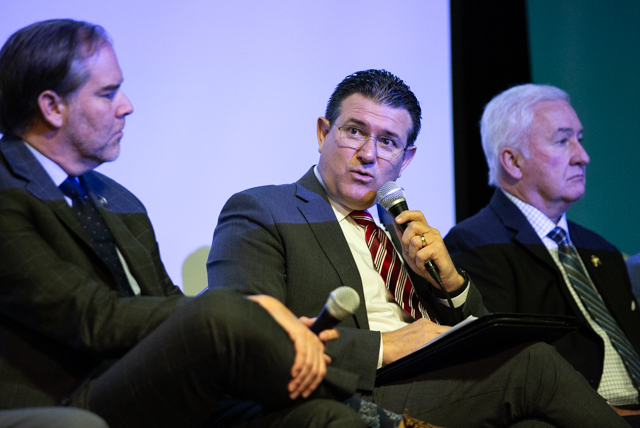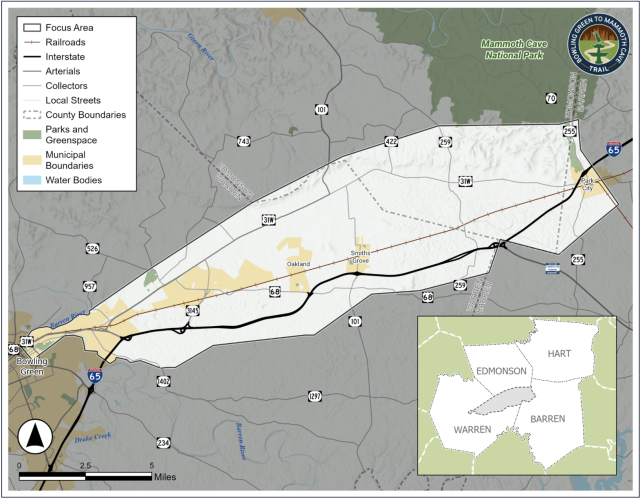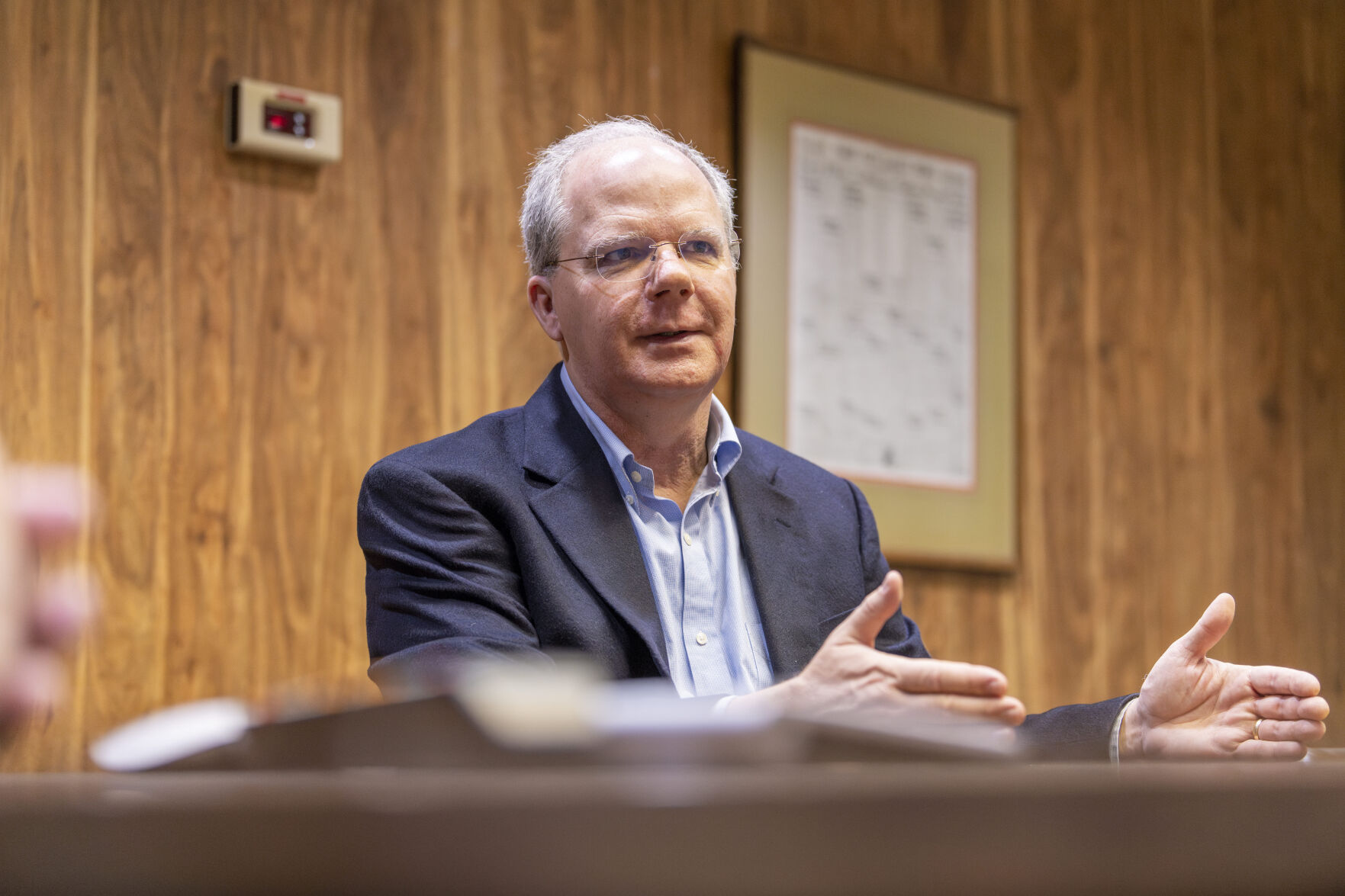Region’s state reps push workforce solutions
Published 12:14 pm Thursday, December 5, 2024

- State Rep. Robert Duvall speaks on a legislative panel moderated by former State Rep. Richie Sanders alongside fellow elected officials State Sens. Mike Wilson and Max Wise and State Representatives Kevin Jackson, Shawn McPherson and Michael Meredith to provide updates on their work this legislative session during the Bowling Green Area Chamber of Commerce’s “Coffee Hour” breakfast event at the National Corvette Museum on Wednesday morning, Nov. 20, 2024. GRACE MCDOWELL / DAILY NEWS
By DAVID MAMARIL HOROWITZ
david.horowitz@bgdailynews.com
Two of southcentral Kentucky’s state house representatives, Robert Duvall and Max Wise, co-chair Kentucky’s Workforce Attraction and Retention Task Force – which, last month, forwarded recommendations and findings for the state legislature’s consideration.
“The bottom line is this: Everybody has something to offer this state, this country,” Duvall said. “So, how do we help them find what they have to offer, and how do we help them be the best version of themselves?”
The co-chairs and their eight co-committee members were tasked to “identify challenges facing Kentucky employers working to recruit and retain talented workers, as well as develop recommendations for potential solutions to the state’s labor shortage,” sums up a Kentucky House Majority Caucus release.
The temporary committee met six times, often with state agencies and partners in the public and private sector. It’s one of four special committees statewide, each tasked to study a specific topic; notably, they’re submitted to House Speaker David Osborne and Senate President Robert Stivers.
“(These committees) get a lot of attention, because these are subjects that we felt, and leadership felt, were important to study,” Duvall said. “I think that will guide (Osborne and Stivers) in terms of what they look at as agenda items for the next (legislative) session in terms of what they would like to see accomplished. And so, I think they use (the task force’s submission) as a springboard, if you will.”
The committee release states that workforce growth has stagnated since 2010. Duvall said factors include a birth rate that hasn’t kept up with an older population, as well as child care, transportation and housing. Meanwhile, Kentucky has one-and-a-half job openings per Kentucky job seeker, according to the release; Duvall said the three primary industries with openings are manufacturing, those in the technical skills, and health care, with the latter especially needing nurses.
Two key themes among the findings include adjusting policies that affect the workforce to better compete with Tennessee – which Duvall says primarily means lowering the income tax – as well as tapping untapped workforce groups, especially, Duvall said, workers from outside the country.
Recommendations
The committee recommends providing $250,000 in funding for a consultant who’ll focus on marketing Kentucky to attract people who’ll help grow the economy.
That firm will consult the Cabinet for Economic Development; the Education and Labor Cabinet; and the Tourism, Arts, and Heritage Cabinet for potential legislation in the 2026 session, according to the release.
Money has been allocated, and “it’s just a matter of starting the process,” Duvall said.
The committee additionally suggests considering both legislative initiatives that help high schoolers obtain technical skills, and initiatives that expand career and technical programs for middle schoolers.
Examples of such initiatives, Duvall said, include Warren County Public Schools’ under-construction IMPACT Center for Leadership and Innovation as well as the organization Graduation Alliance’s adult workforce diploma program, which helps those who didn’t graduate from high school find a pathway to a job.
This means helping students find a job that aligns best with their passion and skills, Duvall said. It’s also key to target demand, he added.
“The question ultimately is, ‘What is there a demand for? … What are the needs out there in our state?’” Duvall said. “And then, we have to customize the program to meet those needs.”
The committee also recommended considering legislation that removes barriers for licensing and credentialing in occupations for groups across Kentucky’s historically untapped workforce as well as legislation that provides opportunities for workers from other countries.
These groups include refugees, other immigrants, disabled people, nonviolent offenders and people with substance use disorders, Duvall said.
“I think there’s a huge opportunity to get folks with disabilities in the workforce and try to find the right match for them … But there’s a lot of barriers there … So how do we remove those barriers that help folks that want to work?” Duvall said.
He also supported providing workforce opportunities for Kentucky’s large population of previously incarcerated nonviolent offenders.
“Once (they’ve) paid (their) time, we need to help these people become productive members of society again,” Duvall said. “They’ve paid their dues.”
Duvall added that getting people with substance abuse disorders into the workforce could also help them with those disorders.
Immigrants sometimes complete degree requirements that may have been somewhat different from what’s required here, Duvall said. In other cases, he added, they’ll experience challenges providing evidence of their degree; one example was an immigrant from Afghanistan who had worked as a nurse but could no longer do so because the Taliban destroyed evidence of her education due to her being a woman, he said.
This has importance: Amid the declining birth rates, Kentucky has only grown due to its immigrant population, Duvall said.
“How do we help them streamline the process of being able to practice as a dentist in Kentucky without having to go through four years of dental school? They’re already a dentist. Can we push that back to two years?” Duvall said. “In reality, they’re really far ahead. They’ve already been practicing in that area. How do we make sure they start practicing whatever health care profession they had? How do we help them do that quicker, but also make sure there are safeguards in place?”
Another consideration the committee recommends is eliminating Kentucky’s income tax for military retirees. Duvall said Kentucky is losing many veterans to Tennessee.
The committee also suggests initiatives to expand access of drivers’ education programs for high school students or new Kentucky drivers, and initiatives that “restore drivers’ license services to local government,” according to the release.
“If you get a license, you’re going to be more likely to have a job,” Duvall said.
While no concrete ideas for what that would look like have been determined, Duvall said the aim would be to try to remove barriers and add opportunities for people to get their license.
The last committee recommendation was considering legislative changes that incentivize public-private partnerships to address challenges targeted by the workforce.
One example, Duvall said, is an existing program where, if an employer puts money toward child care for an employee, the state will match that up to a certain amount.






